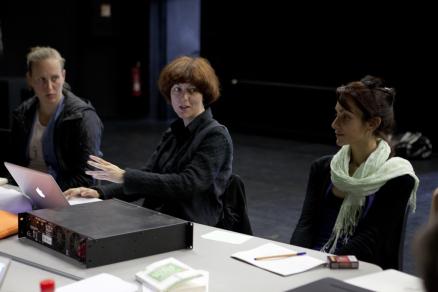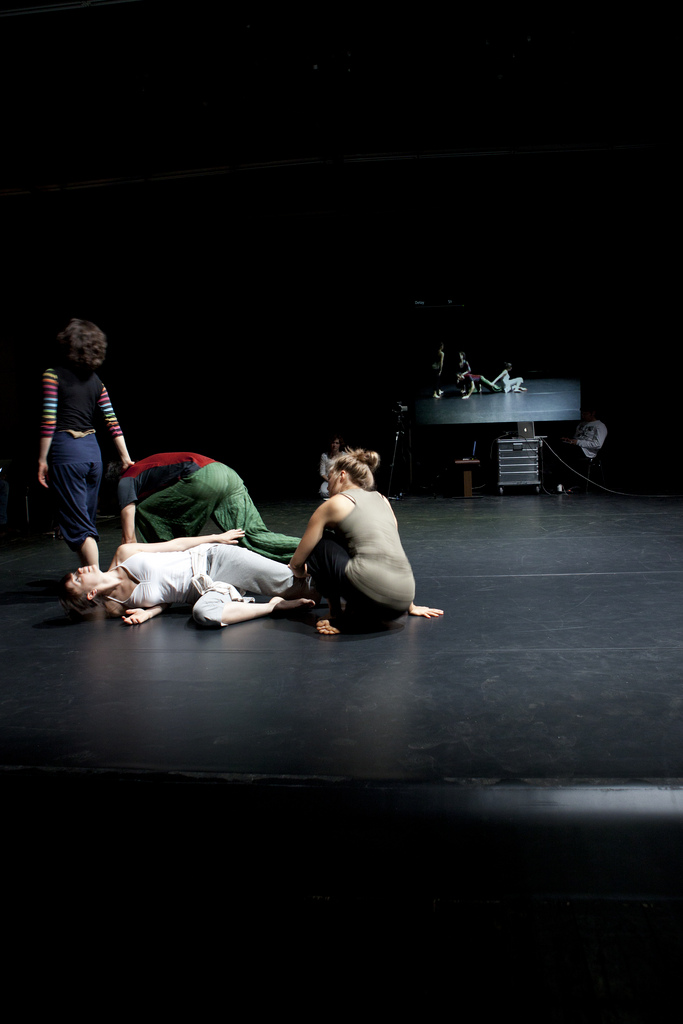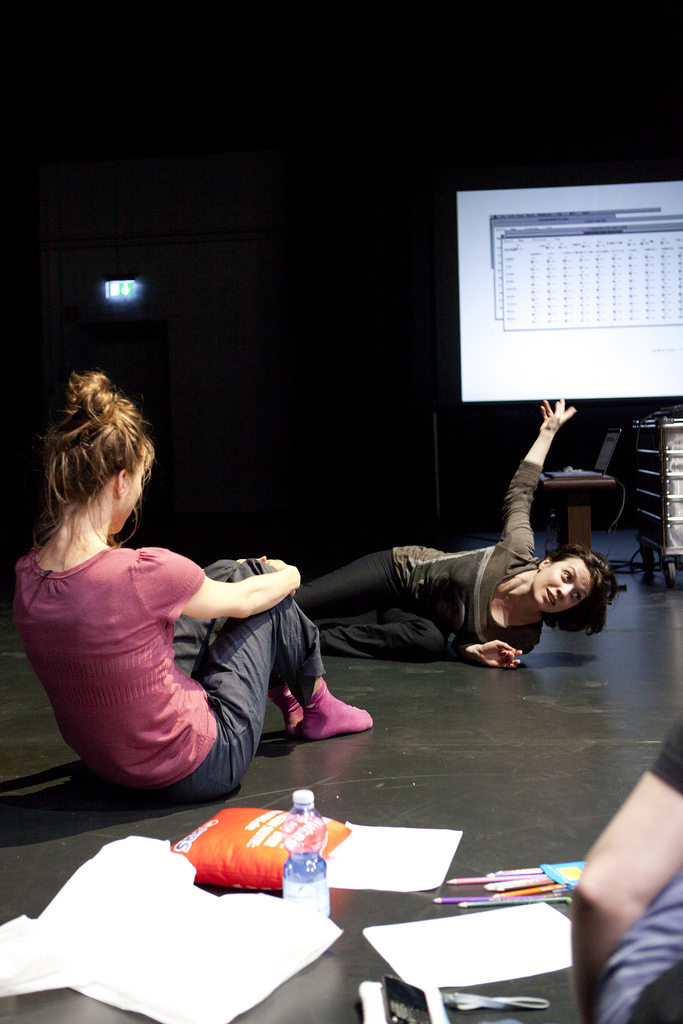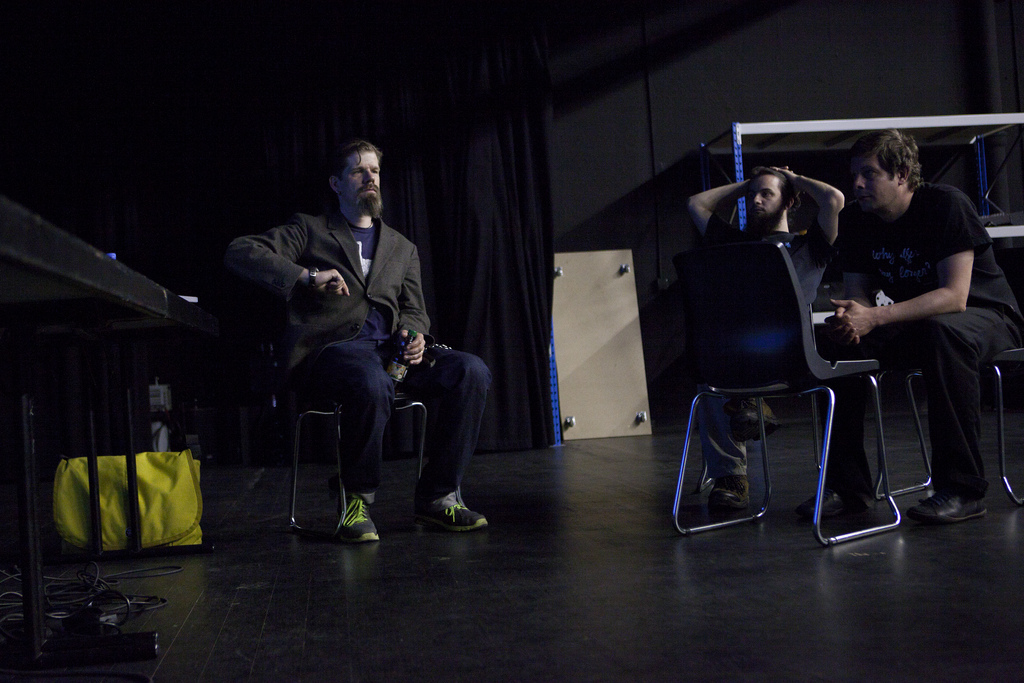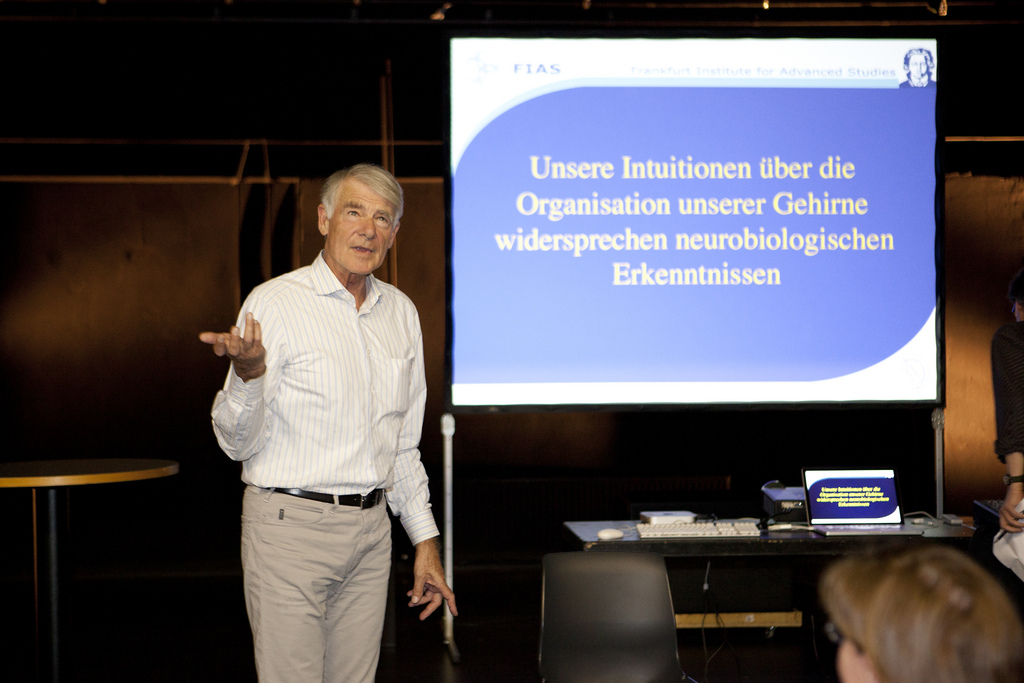Motion Bank Workshop No.1
DANCE & DATA:MIXING SCORES, SENSES, TOOLS AND REFLECTION26-30 April 2011 at The Frankfurt LAB. This first workshop in the series aimed to increase awareness of tools and systems being used to score, notate, create and document dance. The following practitioners were invited to give workshops: Paris-based choreographer Myriam Gourfink, video artist Philip Bussmann, Zagreb-based Performance Collective BadCo., and Ana Vujanović and Petra Sabisch from Everybody’s. |
|
Everybody's and Walking Theory propose / modes of production:games & discussionsThis workshop with Petra Sabisch and Ana Vujanović emerged from the encounter between the two platforms: Everybody's and Walking Theory. They investigated the use of games and discussions as modes of production in performance -- analysing, problematising and systematising these practical proposals to reflect on the invention of new forms of practicing and/or producing. This workshop was organised In cooperation with the Institute for Applied Theatre Studies, Geissen University. |
|
Whatever Dance ToolboxThis workshop with BADco.'s Tomislav Medak and Nikolina Pristaš featured Whatever Dance Toolbox (WDT), a suite of free software tools designed to assist in generating, analyzing, developing and rehearsing choreographic work. WDT is the product of a long-standing research-oriented collaboration around computer-dancer interaction between BADco. and German human-machine interface developer and artist Daniel Turing. These tools employ different types of visual analysis, delay, reverse-play, jitter and slow motion functions, together with long exposition function, to allow dancers and choreographers to study, refine and enrich their movement choices and relationships. Getting familiar with working in technologically conditioned environment, understanding how the machine “sees” the space and movement, working with divided attention, approaching improvisation in terms of montage, learning how to use technology in order to analyze dance and induce a change in the quality of movement, reinventing the quality of relations to other bodies in space are some of the experiences participants had using WDT. |
|
languageThis workshop with Myriam Gourfink is based on her approach to choreography that draws on a precise way of writing dance (see 2008 article by Gourfink) inspired by Rudolf Laban whose invented a notation system (Labanotation) in the beginning of the 20th C. Based on yoga and respiration control, Gourfink's notation approach "inscribes the living process in an almost hypnotically slow space-time". In this workshop, participants explored the connection between weight and breathing and notation. Both weight and breaking raise the question of pre-movements, coming from our most hidden and deepest motor resources. The continuous interaction of this data (weight/ breathing) creates a kind of general "sweeping" happening as much inside the body as in the space around it. The quality of concentration that emerges from the awareness of every psychological and corporeal movement, the performer's personal inner upheaval and the moment itself is what Gourfink tries to approach through her formalised language or notation system. The participants first deepened their awareness of these deep motor resources and then explored how to work them into connection with this formal system of writing. |
|
Technology and Technique:Documenting DanceThis workshop with Philip Bussmann, developed out of his own artistic practice, took the video camera as the now standard tool of the trade for theatre and dance professionals for capturing rehearsals and performances. Improvisations are filmed, rehearsals are analysed and performances documented for recreation and archival reasons. This workshop investigated the possibilities, shortcomings and challenges of documenting dance using »traditional«, non-interactive video technologies and techniques and turning this documentation into artistic works. |
|
On choreographic organisationThis first Salon in the Workshop series featured a talk from Dr. Wolf Singer, from the Max Planck Institute for Brain Research, on how models from neuroscience might shed light on the creation and performance of choreography. His talk was linked to the Dance Engaging Science interdisciplinary research meetings. Also in the context of the workshop, the 2nd biennale meeting of the International Education Workgroup was organised. Members of the workgroup reported on progress on individual projects in Amsterdam, Frankfurt and Berlin. |
|
|
Video Impression: 'Everybodys and Walking Theory propose / modes of production: games & discussions' workshop with Ana Vujanović and Petra Sabisch |
|
|
Video Impression: 'Whatever Dance Toolbox' workshop with Tomislav Medak and Nikolina Pristaš |
|
Embedded VloggerMarlon Barrios Solano, producer of Dance-Tech.Net, took part in Motion Bank Workshop No. 1 as an 'Embedded_Vlogger'. To the right is the interview he recorded with Petra Sabish and Ana Vujanovic. Additionally Marlon recorded interveiws with Myriam Gourfink (in French) and Scott deLahunta. |
|
Workshop Documentation Pages:
http://motionbank.org/en/content/workshops
http://motionbank.org/en/event/project-giessen-2011
http://motionbank.org/en/event/motion-bank-workshop-no1
http://motionbank.org/en/event/motion-bank-workshop-no-2
http://motionbank.org/en/event/motion-bank-workshop-no-3
http://motionbank.org/en/event/motion-bank-workshop-no-4
http://motionbank.org/en/event/motion-bank-workshop-no-5
http://motionbank.org/en/event/motion-bank-laboratory
http://motionbank.org/en/event/choreographic-coding-lab-motion-bank-report
Education Workgroup Meetings Documentation:
http://motionbank.org/en/content/education-piecemaker
http://motionbank.org/en/event/introducing-motion-bank
http://motionbank.org/en/event/motion-bank-workshop-no1
http://motionbank.org/en/event/salzburg-education-workgroup-meeting
http://motionbank.org/en/event/dance-education-biennale-2012
http://motionbank.org/en/event/motion-bank-workshop-no-4
http://motionbank.org/en/event/coventry-education-workgroup-meeting
http://motionbank.org/en/event/tanzkongress-deborah-hay-beta-release-workshops
INFO
As a response to the COVID-19 / Corona situation we just opened our research system (including Piecemaker and MoSys) for dance education and practice.
This year Motion Bank celebrates it's 10 anniversary. As soon as it becomes possible to make final plans we will release information about these.
Please consider subscribing to our newsletter.


